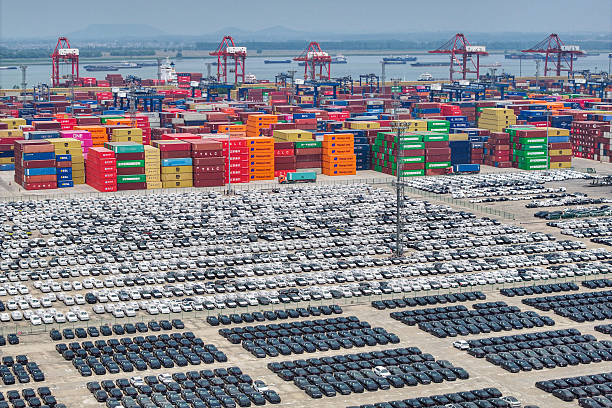Americans are getting their first glimpse of life with tariffs
Tariff exemptions on imported goods costing less than $800 have expired, affecting some $66 billion in orders

American consumers, already feeling the pinch from various economic pressures, are now bracing for a potential rise in prices on a wide array of goods that were once considered affordable. This shift is due to the expiration of a long-standing tariff exemption for imported goods valued under $800, known as the de minimis tariff exemption. This exemption, which had previously allowed low-cost items to enter the U.S. without import duties, officially ended just after midnight on May 2. In its place, a hefty 145% tariff, originally introduced during the Trump administration, has been imposed on all products ordered directly from retailers based in China.
Suggested Reading
According to a congressional report, nearly one billion low-cost packages, valued at over $66 billion, were imported into the United States in 2023, with 67.4% of these shipments originating from China. The expiration of the de minimis exemption is expected to have a significant impact on consumers, particularly those with lower incomes. A study conducted by economists from Yale and UCLA highlighted that the removal of this exemption would disproportionately affect lower-income and minority consumers. The research indicated that nearly half of the shipments benefiting from the de minimis exemption were destined for low-income ZIP codes. Consequently, these consumers are likely to feel the effects of the tariffs acutely, as prices on many goods rise.
Related Content
Several companies have already announced plans to make the added cost of tariffs visible to consumers at checkout. Online fast-fashion retailer Shein, for example, intends to include the tariff costs as a separate line item during the purchasing process. While Amazon initially considered a similar approach, it reportedly reconsidered under pressure from the White House. However, UPS has introduced a service that allows customers to see the full cost of their purchase, including tariffs, before completing their transaction.
Companies like Shein, Temu, and Amazon, along with numerous smaller firms, have built their business models around the de minimis exemption. In response to the new tariffs, Shein and Temu have already begun raising prices to offset the additional costs. The increase in prices is unlikely to bolster former President Trump's approval ratings, which have been affected by concerns over the economy and the impact of tariffs. During a cabinet meeting, Trump referred to the de minimis exemption as "a big scam" and expressed satisfaction at its termination.
The responsibility for collecting tariff payments on incoming packages from China and Hong Kong now falls on shippers. Packages delivered via UPS, FedEx, and other independent carriers will incur a 145% tariff. Meanwhile, customers receiving shipments through the postal service have the option to pay either 120% of the product's value as a tariff or a flat fee of $100, which will increase to $200 after June 2. Ultimately, the cost burden will be borne by the consumer unless the business shipping the package opts to cover the tariff upfront.
The de minimis exemption was first established by Congress in 1938 for goods valued at $1 or less, with the aim of avoiding the administrative costs associated with collecting small import levies. Over the years, the threshold has been raised several times, most recently reaching $800 in 2016. The Trump administration initially attempted to eliminate the de minimis loophole in February, but implementation was delayed when packages began to accumulate as Customs and Border Protection worked to develop a new screening system.
The expiration of the de minimis exemption marks a significant shift in U.S. tariff policy, particularly in relation to Chinese imports. The policy change is part of a broader strategy to address trade imbalances and protect domestic industries, but it also raises concerns about the potential impact on consumers, especially those with limited financial resources. As the new tariffs take effect, consumers and businesses alike will need to navigate the challenges posed by higher costs and adjust their purchasing and pricing strategies accordingly.
The expiration of the de minimis exemption underscores the complexities of international trade policy and its far-reaching implications for the economy and everyday consumers. For low-income consumers, who often rely on affordable imports for essential goods, the impact could be particularly severe. The removal of this exemption means that many of the goods they depend on will become more expensive, potentially straining already tight budgets.
For businesses, especially those that have thrived under the de minimis exemption, the challenge will be to find ways to absorb or pass on these new costs without alienating their customer base. Some may choose to diversify their supply chains or seek alternative markets to mitigate the impact of the tariffs. Others might invest in technology or process improvements to reduce costs elsewhere in their operations.
In the broader context of U.S.-China trade relations, the expiration of the de minimis exemption is a clear signal of the ongoing tensions between the two economic giants. While the intention behind the policy change is to protect domestic industries and reduce trade deficits, it also highlights the interconnectedness of global supply chains and the difficulties in disentangling them without causing disruption.
As consumers and businesses adjust to this new reality, it will be important for policymakers to monitor the effects of the tariff changes and consider additional measures to support those most affected. This could include targeted assistance for low-income consumers or incentives for businesses to invest in domestic production. Ultimately, the goal should be to strike a balance between protecting domestic interests and ensuring that the benefits of global trade are shared equitably.
